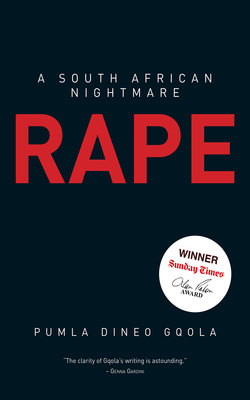Читать книгу Rape - Pumla Dineo Gqola - Страница 3
Acknowledgements
ОглавлениеThe insights in this book are drawn from what I have been taught by observing and reading the work of numerous people, as well as from conversations over a lifetime, even though the limitations are all mine. I am grateful to Nombulelo Ncata, Bulela Mjika, Vuyolwethu Mabeqa for things too numerous to mention, but especially the capacity to choose the more difficult option, to confront the truth when this was not easy, and the capacity for love, as well as for loyalty, to principle and other girls, long before any of us had ever heard the words ‘feminism’ or ‘women’s empowerment’ or ‘queer’. I am also grateful to them for the many things that they probably did not even realise they were teaching me. Noluthando Qongqo, the late Nomfanelo Nongongo and Lulama Nongogo, thank you for a conversation that changed my outlook on rape and for having my back. Thumeka Scwebu, Unathi Conjwa, Thozama Vokwana, Thulani Khanyile, Angelo Fick and Madi Jenneker thank you inspiring me with courage, and for being everything. Penny Parenzee, Ayanda Mvimbi, Ingrid Masondo, Vuyo Koyana, Nomfundo Walaza for Rape Crisis lessons too many to mention and teaching me how to concretely contribute to the fight against patriarchal violence. Caroline Skinner, Thandi Lewin, Paula Kingwill, Ruth Hall, Wendy Woodward and Thandeka Kunene, thank you for being my community of undergrad feminist troublemakers at Gender SubCom, Women’s Forum and Women’s Movement, UCT, but decidedly not for all the time we spent bromiding posters. Shireen Hassim and Jacklyn Cock, thank you for pushing me to go further in my thinking and for reflections on the language with which to say it; this book and the next would not have been written without you. Desiree Lewis, Mary Hames, Elaine Salo, Jane Bennett, Helene Strauss, I am grateful for inspirational work that always stretches and inspires me, even when we have disagreed. Wendy Isaack, Bunie Matlanyane Sexwale, Prudence Mabele, Mmatshilo Motsei, Nokuthula Mazibuko Msimang, Steve Letsike, Carrie Shelver, Kwezilomso Mbandazayo, Mpumi Mathabela, Mpumi Simelane, Thamsanqa Scaps Zulu, Neo Sinoxolo Musangi, Prudence Mabele, Pumeza Ceza, Xoliswa Sithole, Kodwa Tyiso, Donna Smith, Zanele Muholi and Den Ngoqo, I am in awe of your brains and courage. Thank you to everybody at One in Nine. Simmi Dullay, Lungisa Mkentane, thank you for your open hearts and generosity at times when courage would be impossible for most. Thank you to the many women, whose names I cannot mention, who have trusted me, taught me and held me accountable.
Chapter 3 has a previous life as the Ruth First lecture “After Zuma: rape and the Constitution” presented at Constitution Hill on 15 November 2006. Extracts from this lecture were published as ‘The hype of women’s empowerment’ in Mail and Guardian, 23–30 November 2006, as well as “Gender talk is seriously flawed” in Cape Times, 27 November 2006. The revised lecture appeared in academic form as “How the ‘cult of femininity’ and violent masculinities support endemic gender based violence in contemporary South Africa”, published in African Identities 5.1(2007):111-124. I am grateful to the Ruth First Fellowship Committee, and especially Shireen Hassim and Jacklyn Cock, who read and commented on drafts, and the Heinrich Böll Stiftung for the time to write and rewrite. Chapter 8 draws extensively from, revises and expands arguments first made in “‘The difficult task of normalising freedom’: spectacular masculinities, Ndebele’s literary/cultural commentary and post-apartheid life”, published in English in Africa 36.1(2009): 61-76. Different parts of the book contain arguments from “2013 is a bad year for gender struggle: GBV, South Africa and feministing differently”, presented at the African Gender Institute Talking the Walk Lecture on 29 April 2013 at All Africa House, University of Cape Town. The event was co-hosted by the Centre for Women and Gender Studies and Gender Equity Unit, both at the University of the Western Cape. I am grateful to Jane Bennett, Desiree Lewis and Mary Hames, for the resources and time they allocated me to write, present and reflect on the presentation, as well as for the conversation and community they made possible. Some arguments in this paper were also previously explored in “If sexuality is the new religion, how do we avoid fundamentalism?”, a public lecture presented at the University of the Western Cape on 24 April 2007 on the invitation of former Minister Z Pallo Jordan during his tenure at the Department of Arts and Culture. I am indebted to all the questions, comments, provocations and conversations that happened after these lectures and seminars at the University of the Western Cape, University of Fort Hare, University of Cape Town, University of the Free State and various places in the Eastern Cape and Johannesburg. None of the chapters or lectures appear here verbatim from any of the previous sources of presentation or publication.
Grace Musila, thank you, again, for meticulous reading, incisive feedback and elegant editing of another manuscript from me. Melinda Ferguson, whose patience I test way beyond the reasonable, thank you for being a dream publisher once again, and for saying “We’re not robots, we’re human beings”. Danai Mupotsa, I just cannot believe your mind. You are such a treasure.
To my friends, Dina Ligaga and Sarah Chiumbu, whose minds and presence are an enormous gift to me, who go to lunch with me when I have writer’s block or am too afraid to write, and help me put it all in perspective. I don’t know what I ever did without you. Thank you.
Finally, thank you to my family: my mother, my siblings, son, partner and bestie for your patience in dealing with my emotional unavailability as I took much longer to write this book than I said I would, my falling asleep mid-conversation, cancelled plans, crankiness, unreturned phone calls, sleeping all day and working all night, late collections and everything else that complicated our lives.
